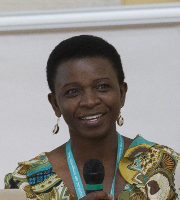Angeline Takawira-Magaya is a Digital Archivist at the United Nations International Residual Mechanism for Criminal Tribunals.
Trustworthiness is a goal for every digital repository and organizations are increasingly interested in demonstrating it by obtaining certification as a trustworthy digital repository (TDR). However, pursuing certification requires a significant investment of time and effort so it must be a well-considered decision. The anticipated benefits for the organization and its stakeholders must be articulated clearly, and weighed against the likely costs involved, to determine whether the TDR certification is essential, desirable or just “nice to have”.
One of the most consistently promoted benefits of TDR certification is that it increases stakeholder confidence and enhances the reputation of a repository. While there is, as yet, little empirical evidence to support this, I think that the community could agree that TDR certification standards are potentially valuable tools for evaluating and benchmarking a repository’s performance. They all broadly address common elements of a digital repository – organizational infrastructure, digital object management, technologies and technical infrastructure, and security – and, as standards, provide a credible basis for self-assessment and improvement, even if certification is not the ultimate goal.
We aspire to achieve TDR certification for our digital repository. We expect this to assure our stakeholders that the digital archives of the International Criminal Tribunal for Rwanda, the International Criminal Tribunal for the former Yugoslavia, and the Mechanism will continue to be authentic, reliable, accessible and usable in the future, and that the financial investment made by United Nations Member States to preserve the archives is being protected through our responsible stewardship. As preparation, we have undertaken self-assessments using the DPC Rapid Assessment Model (RAM) and the requirements for CoreTrustSeal certification. Appraising all aspects of our digital repository - governance, staffing, policies and processes, financial sustainability, technical infrastructure, preservation planning, archival storage, security and access – has improved our understanding of its strengths and weaknesses, and the results have provided us with a benchmark for continuous improvement. To supplement our self-assessments, we commissioned an independent peer review against the requirements for CoreTrustSeal certification. This has not only provided external validation of our repository’s status against the certification criteria but has also confirmed the fairness and objectivity of our self-assessment.
We have not yet decided when to pursue certification, but these preparatory activities have already delivered significant internal benefits. As we continue the process, we will build on our strengths while addressing our weaknesses in a focused and coherent way, to minimize risks and maximize opportunities.













































































































































